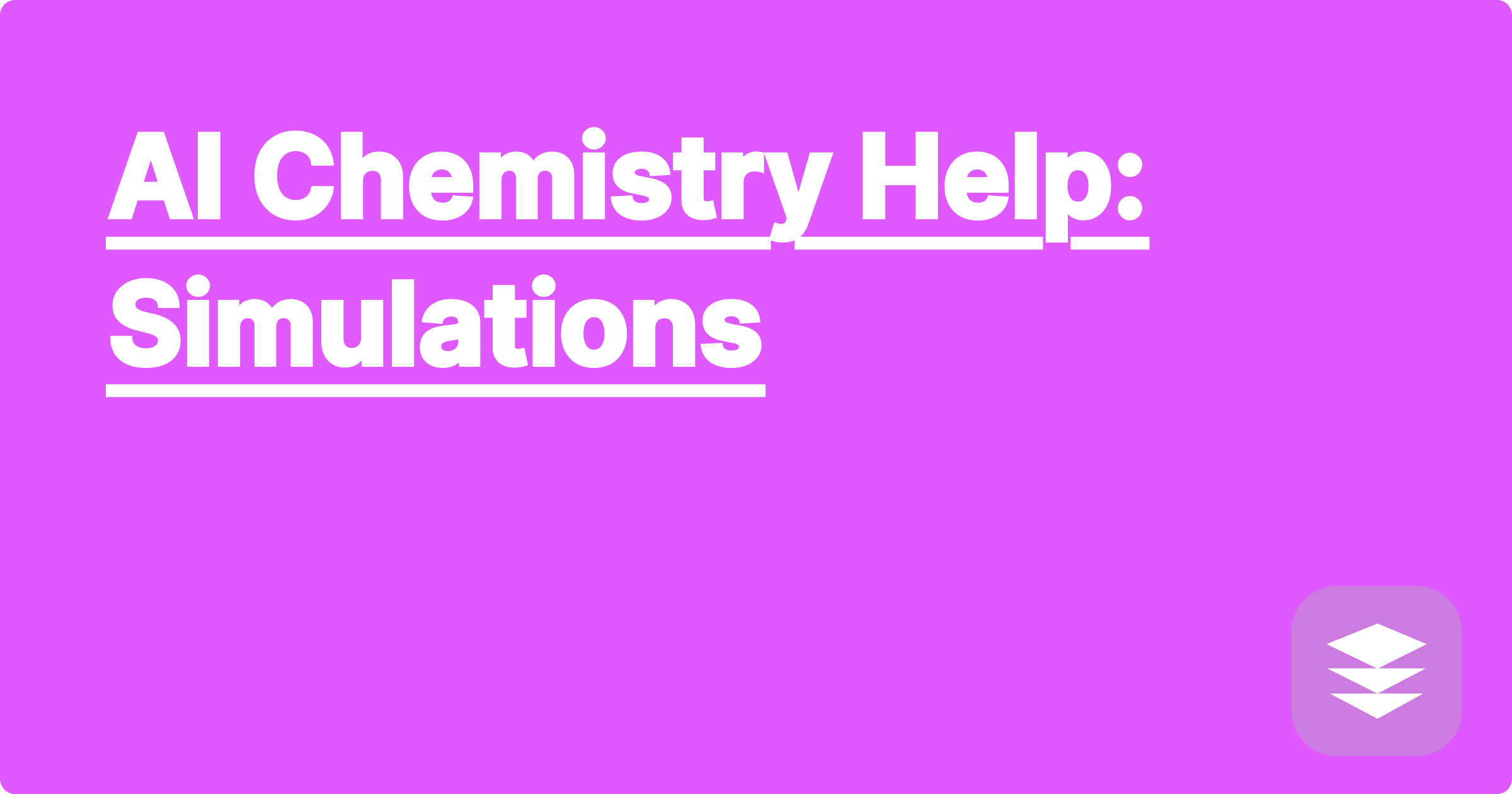
The world of STEM is challenging, demanding rigorous study, complex problem-solving, and countless hours dedicated to understanding intricate concepts. For many students and researchers, this can feel overwhelming, leading to burnout and hindering academic progress. However, a new wave of AI-powered tools is emerging, offering innovative solutions to these very challenges. These tools are not just about making things easier; they're about transforming how we learn and conduct research, opening doors to deeper understanding and unlocking unprecedented levels of efficiency. This blog post will explore how AI, specifically focusing on simulations in chemistry, can revolutionize your academic journey, helping you achieve your full potential and excel in your field.
Imagine having a personalized tutor who can guide you through complex chemical reactions, predict outcomes, and even design experiments. This is the power of AI-driven simulations in chemistry. These powerful tools are changing the game for STEM students and researchers, providing a dynamic and interactive way to learn and explore. Whether you're struggling with stoichiometry, grappling with molecular dynamics, or designing a novel synthesis pathway, AI simulations offer a powerful platform for experimentation, exploration, and ultimately, mastery. This isn't just about getting the right answers; it's about developing a deep, intuitive understanding of the underlying principles governing the chemical world.
Chemistry, at its core, involves the interaction of atoms and molecules. Understanding these interactions, predicting their outcomes, and manipulating them to achieve desired results forms the basis of chemical research and development. Traditionally, this has involved laborious experiments, complex calculations, and often, a degree of trial and error. Visualizing molecular interactions and predicting reaction pathways can be particularly challenging, requiring significant mental effort and often relying on static representations that fail to capture the dynamic nature of chemical processes. This is where the power of AI-driven simulations comes into play.
AI-powered platforms like GPAI, along with tools like Wolfram Alpha and specialized chemistry software, offer a transformative approach to learning and research in chemistry. GPAI, for example, can generate personalized learning plans tailored to your specific strengths and weaknesses, focusing on areas where you need the most support. It can also integrate with AI-powered time management apps, helping you optimize your study schedule and maximize productivity. Furthermore, platforms like Wolfram Alpha can perform complex calculations, predict reaction outcomes, and even provide step-by-step solutions to challenging problems. By leveraging these tools, you can move beyond rote memorization and develop a deeper, more intuitive understanding of chemical principles.
Let's say you're studying reaction kinetics. Instead of simply memorizing rate equations, you can use an AI-powered simulation to visualize the reaction at the molecular level. You can adjust parameters like temperature, concentration, and catalysts, observing in real-time how these changes affect the reaction rate. GPAI can then provide personalized quizzes and practice problems based on your simulation results, reinforcing your understanding and identifying areas where you might need further review. You can also use Wolfram Alpha to verify your calculations and explore related concepts, deepening your knowledge and building a solid foundation. By combining these tools, you can transform a passive learning experience into an active and engaging exploration of chemical principles.
Consider the challenge of designing a new catalyst for a specific chemical reaction. Traditionally, this would involve extensive experimentation and often a significant degree of trial and error. However, with AI-powered simulations, you can model different catalyst candidates and predict their effectiveness in silico, significantly accelerating the discovery process. For instance, you could use a molecular modeling software integrated with an AI platform to predict the binding energies of different molecules to a catalyst surface, providing insights into the reaction mechanism and guiding the design of more efficient catalysts. You can even visualize the interaction of reactants and products with the catalyst surface in real-time, gaining a deeper understanding of the catalytic process.
Integrating AI tools into your workflow can significantly enhance your academic performance. Start by identifying areas where you struggle the most. Are you having difficulty visualizing molecular structures? Are you struggling with complex calculations? Once you've pinpointed your weaknesses, explore AI tools that can address these specific challenges. For example, if you're struggling with molecular visualization, use a molecular modeling software integrated with an AI platform like GPAI. If you're struggling with calculations, leverage the power of Wolfram Alpha. Remember, these tools are not meant to replace your understanding but to enhance it. Use them to supplement your learning, not as a shortcut. Combine AI-powered learning with traditional study methods, such as attending lectures, reading textbooks, and working through practice problems. Furthermore, prioritize time management. Utilize AI-powered scheduling apps to create a study plan that aligns with your goals and deadlines. Finally, don't neglect your mental well-being. Academic success is not just about grades; it's about maintaining a healthy balance between your studies and your personal life. Explore AI-powered mindfulness apps and incorporate stress-reducing activities into your daily routine.
To maximize your academic success, embrace the power of AI and integrate it strategically into your learning and research. Explore different platforms, experiment with various tools, and discover the methods that work best for you. Don't be afraid to seek guidance from professors, mentors, and fellow students. By combining the power of AI with effective study habits and a proactive approach to learning, you can unlock your full potential and achieve your academic goals. The future of STEM learning is here, and it's powered by AI.
AI Research Assistant: Streamline
AI Homework Help: STEM Solutions
AI Simulations: Run Experiments